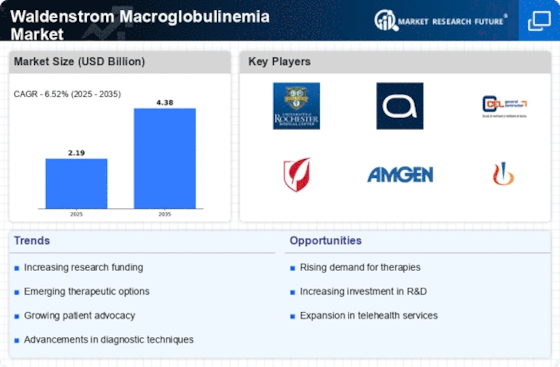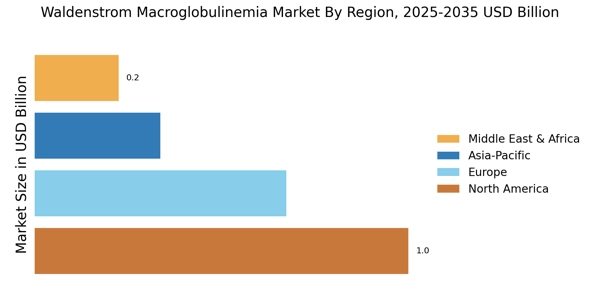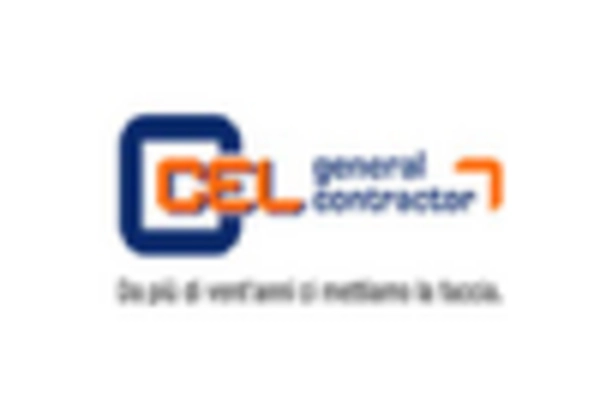Advancements in Diagnostic Techniques
Recent advancements in diagnostic techniques for Waldenstrom Macroglobulinemia Market are poised to influence the market positively. Enhanced imaging technologies and biomarker identification methods have improved the accuracy of diagnosis, allowing for earlier detection and intervention. This progress is crucial, as timely diagnosis can significantly impact patient outcomes and treatment efficacy. The Waldenstrom Macroglobulinemia Market is likely to benefit from these innovations, as they may lead to an increase in diagnosed cases and, consequently, a higher demand for targeted therapies. Furthermore, the integration of genetic testing and personalized medicine into diagnostic protocols could facilitate tailored treatment approaches, enhancing patient care. As healthcare providers adopt these advanced diagnostic tools, the market may experience a surge in growth, driven by the need for effective management strategies and improved patient outcomes.
Emergence of Novel Therapeutic Agents
The emergence of novel therapeutic agents specifically targeting Waldenstrom Macroglobulinemia Market is a pivotal driver for the market. Recent developments in drug research have led to the introduction of several promising therapies, including monoclonal antibodies and small molecule inhibitors. These agents are designed to address the unique pathophysiology of the disease, offering patients more effective treatment options. The Waldenstrom Macroglobulinemia Market is witnessing a shift towards personalized medicine, with therapies tailored to individual patient profiles. As clinical trials continue to yield positive results, the approval and adoption of these novel agents are expected to accelerate. This trend not only enhances treatment efficacy but also expands the therapeutic landscape, potentially leading to improved patient outcomes and increased market share for pharmaceutical companies involved in this sector.
Growing Awareness and Education Initiatives
Growing awareness and education initiatives surrounding Waldenstrom Macroglobulinemia Market are likely to play a crucial role in shaping the market. Increased efforts by healthcare organizations and patient advocacy groups to educate both the public and medical professionals about this rare condition are fostering a better understanding of its symptoms and treatment options. As awareness rises, more patients may seek diagnosis and treatment, thereby driving demand within the Waldenstrom Macroglobulinemia Market. Furthermore, educational campaigns can empower patients to engage in their care actively, leading to improved adherence to treatment regimens. This heightened awareness may also encourage healthcare providers to pursue further research and development in this area, potentially resulting in innovative therapies and improved patient outcomes. Consequently, the synergy between education and market growth could yield substantial benefits for stakeholders.
Increased Investment in Research and Development
Increased investment in research and development for Waldenstrom Macroglobulinemia Market is emerging as a vital market driver. Pharmaceutical companies and research institutions are allocating more resources to explore novel treatment modalities and improve existing therapies. This trend is indicative of a broader commitment to addressing unmet medical needs within the Waldenstrom Macroglobulinemia Market. As funding for clinical trials and innovative research initiatives rises, the potential for breakthroughs in treatment options expands. This influx of investment not only accelerates the pace of discovery but also enhances collaboration among stakeholders, including academia, industry, and patient advocacy groups. The resulting synergy may lead to the development of more effective therapies, ultimately improving patient outcomes and driving market growth. The focus on research and development underscores the importance of innovation in addressing the complexities of this rare disease.
Rising Incidence of Waldenstrom Macroglobulinemia
The increasing incidence of Waldenstrom Macroglobulinemia Market appears to be a significant driver for the market. Recent estimates suggest that the prevalence of this rare lymphoproliferative disorder is on the rise, with approximately 3,000 new cases diagnosed annually in certain regions. This uptick in cases necessitates enhanced treatment options and healthcare resources, thereby propelling the Waldenstrom Macroglobulinemia Market forward. As awareness grows among healthcare professionals and patients alike, the demand for innovative therapies and supportive care is likely to increase, further stimulating market growth. The need for specialized treatment centers and comprehensive care plans may also emerge, indicating a shift in how this condition is managed. Consequently, the rising incidence not only highlights the urgency for effective solutions but also underscores the potential for market expansion.

















